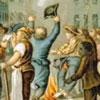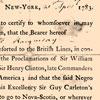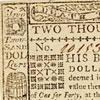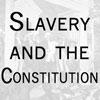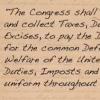Challenges of governance, and especially monetary policy, plagued the United States under the Articles of Confederation. By the middle of the 1780s, many people, most notably the Federalists, were calling for the Articles to be revised. The Federalists succeeded in getting Congress to hold a convention in 1787 in Philadelphia to discuss revisions to the Articles. By that time, some delegates, among them James Madison, had decided that a confederation would never work and that a wholly new system of government was needed. This launched the process to draft the Constitution.
A variety of opinions and beliefs informed the debate over the Constitution. Delegates from the newly-independent colonies had different ideas about the role of the federal government and the distribution of power. The question of slavery was a contentious issue.
The delegates eventually settled on a compromise that continued slavery and prohibited a decision about the international slave trade for a period of 20 years. While slavery was not specifically sanctioned, the challenge of addressing slavery in a country founded on the basis of liberty and equality was delayed.
Some of the founders expressed discomfort with this situation, even while owning slaves themselves. In this address, Patrick Henry spoke out against slavery in conflicted terms.
Patrick Henry on Slavery, January 18, 1773
It is not a little surprising that Christianity … should encourage a Practice so totally repugnant to the first Impression of right & wrong …. Is it not amazing, that at a time, when the Rights of Humanity are defined & understood with precision, in a Country above all others fond of Liberty, that in such an Age, & such a Country we find Men, professing a Religion the most humane, mild, meek, gentle & generous, adopting a Principle as repugnant to humanity as it is inconsistent with the Bible and destructive to Liberty ….
… Would any one believe that I am Master of Slaves of my own purchase! I am drawn along by the general inconvenience of living without them ….
I believe a time will come when the oppo. will be offered to abolish this lamentable Evil. Every thing we can do is to improve it, if it happens in our day, if not, let us transmit to our descendants together with our Slaves, a pity for their unhappy Lot, & an abhorrence for Slavery. If we cannot reduce this wished for Reformation to practice, let us treat the unhappy victims with lenity, & it is the furthest advance we can make toward Justice.
Source: Patrick Henry, “Patrick Henry to Robert Pleasants, January 18, 1773” 1773, Patrick Henry Digital Library, accessed September 20, 2018.



